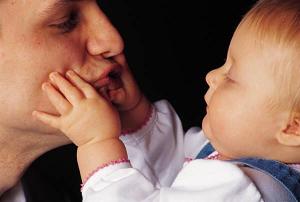Eight Things you must do when you have pets and a new baby

The birth of your first child is an unforgettable experience – for the family pet! It is likely that your Pooch, your Puss-cat and even your Perplexed Parrot are going to feel very displaced with the cabbage patch’s produce. After all, your pet was your child substitute, wasn’t it? What preparations will help your perplexed pet and what is the risk of your pet causing disease in, or injury to, your baby?
Prepare the Nursery
Your first step is to prepare your pet by preparing your nursery and this task should be tackled several weeks before the baby is due. For hygiene and safety reasons, the nursery should be a ‘pet free’ area with a self-closing screen door to keep curious pets out. Apart from hygiene concerns, there have been rare cases where a cat has suffocated a child by sleeping on top of it.
The commotion involved in creating the nursery will be very visible to your pet and could make it anxious. However, if the changes are completed in plenty of time, your pet will have time to adjust before the baby arrives. It’s a good idea to install a battery operated motion sensor to the nursery door that will alert you if one of your pets enters that room.
Disease and Hygiene
On the topic of hygiene, pets can transmit diseases to babies but, in reality, serious diseases are rare. Various bacteria, worms and other infectious agents can be transmitted to children from pets and some diseases are transmitted from infected cats to the unborn child.
The bacteria that pets can share with babies mostly cause abdominal upsets. Worms transmitted from pets to children can cause muscle, joint and abdominal pains, neurological disturbances and even blindness and the fungal skin infection, ringworm, is another potential problem.
Lastly, if you are a cat owner, you need to be aware of Toxoplasmosis. This single-celled parasite is transmitted from young cats to unborn children via the child’s pregnant mother. It can cause blindness and other problems.
Pets can transmit diseases to babies but, in reality, serious diseases are rare.
All the above infections are extremely rare and simple hygienic measure will stop all such problems.
- After either you or your baby has played with your pets, wash your hands
- Don’t let pets lick your baby, especially on the face and hands.
- Cover the sandpit when it is not in use.
- Pregnant ladies should wear gloves when gardening.
- Don’t let your infant crawl in areas where your dog has soiled and remove all of your pet’s deposits from the garden on a daily basis.
- Worm your dog regularly. Pups should be wormed every two weeks until three months old, then monthly until six months old. Beyond six months of age, every dog should be wormed every three months. Use a monthly heartworm preventive that also kills intestinal worms but be aware than none of these will kill all intestinal worms so a three monthly all-wormer is still important.
- If your pet is unwell, especially if it has diarrhoea or a skin disease, consult your veterinarian.
- Keep your pet free of fleas
Non Toxic Flea Control
When you have a baby, consider moving away from chemical insecticide rinses for your pet that you drench its coat with insecticide. The ‘spot on the neck’ preparations are good, but keep your pet away from your baby for at least 48 hours while the insecticide dissipates.
Alternatively there are several tablet preparations that will control fleas and some that also control worms at the same time. See your vet for details.
Your Pet’s Behaviour
You are likely to be concerned about the effect of your baby on your pet’s behaviour.
When you bring your baby home for the first time, your dog and cat are bound to be curious. There are so many pleasant, and some not so pleasant, odours that are associated with babies that your pets will find most inviting. Include the various vocal arrangements that babies practice at random and your necessary distraction away from your pets in favour of the alien usurper and your pets are sure to be curious.

Most pets adapt very well but aggressive pets mixing with infant children are an obvious concern. Sadly, the face and head are the commonest sites of injury when things go wrong.
Allow your pets to gently investigate your baby. Allow some cautious sniffing but no licking. Speak to your pets in soothing tones and massage their ears and faces to reassure them. Start with brief introductions at first and build up the duration as your pets become acquainted.
Consider walking your dog and baby together. Have your baby in a papoose as managing a boisterous dog and an untrained and disobedient pram at the same time can be difficult and dangerous.
Back in the home, play pens and baby gates can be used to control interactions. A play pen can confine your baby while your pets are free, or your pets while your baby is free and baby gates are very useful to allow cats and small dogs to escape from the terror toddler!
It is also advisable to get your pets used to spending more time away from you before the baby arrives, as this will be the reality of your pets’ future.
For the last month or two of your pregnancy, leave your pets outside more often but do this by giving your pets something rewarding to distract them such as a Kong toy or Roller Treat Ball.
Don’t be too concerned. Most pets get on very well with new babies and nothing is more rewarding than seeing a child and pet sharing mutual love.
Review questions
- What’s the easiest way of keeping pets out of the nursery?
- What single-cell parasite is a (very rare) problem for cat owners and their newborn?
- Name four hygiene-related tasks that will keep your baby healthy
- What physical items could you install to control interactions between your baby and your pets?
